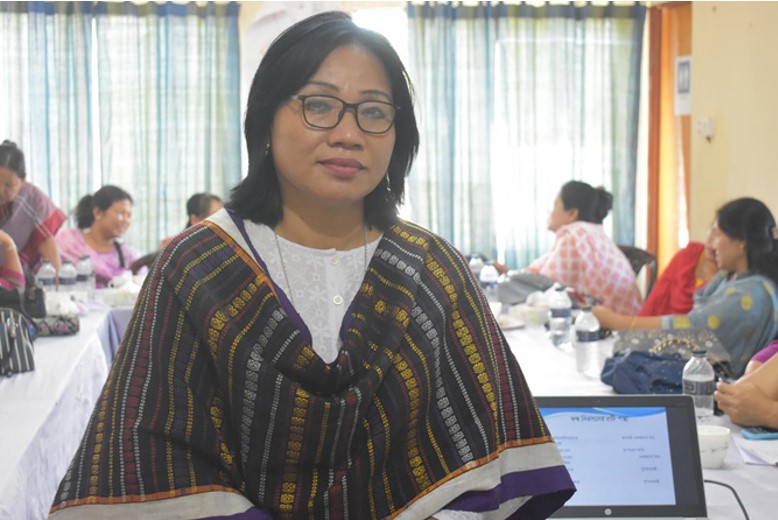Women appointment as traditional leadership positions in CHT contributing in reducing women vulnerability
The twilight is yet to take a little bit of time to cover the valley of the hills near the Trbial Adam, adjacent to the Banarupa in Rangamati Township. The tiny woman around 34 years old with short cut hair wants some privacy in a small tea shop where she can open up herself and speak of her story without any hesitation.
“We have been married for around eight years, and with a seven years old son had a very happy family. The act of physical assault by him started from when he got into an extramarital affair,” she said.
“His very common style of assaulting me is wrapping my knee with my long hair around his wrist and punching on my skull unceasingly with heavy force,” says the victim, and continues “that is exactly the reason why I cut my hair short.”
The most violent attack occurred on her in November 2018, the day when her in-laws went to another upazila to visit family.
She stated, “My husband arrived home around 4 O’clock in the morning. When I asked him why he was so late and argued about the reason for the lady. Then without any word he started to slap me hard, when I hit back I was knocked down with twice the force by him. He is gigantic and almost thrice the size of me.’ She added, ‘then he continues to attack me on my skull and keep me hanging by squeezing my neck with two hands. In that time I got a little control over me and bit his fingers so hard that he had to release me.’
While the noise of screaming caught the attention of the neighbours, her brother-in-law immediately broke the door and rescued her. And her sibling informed Para Karbari (Community leader) Alochona Chakma and took her to the hospital. Alochona Chakma immediately went to the hospital and took all the responsibilities to admit her in the hospital.
After some days, with the proactive initiatives of the Alochona Chakma, a Salish (community mediation) was called and with the presence of some other respected village elders, and her husband admitted his guiltiness and confessed he will never physically and verbally assault his wife. In front of them, the husband signed a bond and agreed to terminate his extramarital affair immediately.
In the three hill districts (Bandarban, Khagrachari and Rangamati) in CHT, there are eleven indigenous ethnic communities, and their traditional social and land administration system governs following the Chittagong Hill Tracts Regulation, 1900. Under the leadership of the Circle Chief, the Karbaries and Headmen are empowered to resolve family and/or social disputes like domestic violence and land disputes between neighbours. Usually Karbari deals with problems in the village (family and social disputes), Headman with problems in the mouja (land and other social disputes), and Circle Chief with overall problems of the community. However, from the very beginning, the traditional leadership positions were highly male dominated and women rarely had access to these positions.
Since 2002, Association for Land Reform and Development (ALRD) has been working with the Office of Chakma Circle and Headman and Karbaries in three hill districts. With continued efforts and capacity building initiatives of these traditional institutions, Headmand and Karbari Network is formed in three hill districts and Circle Chiefs (Chakma, Bomang and Mong) have been influenced to appoint women as traditional leaders. Since then, as a part of these continuous efforts, women have been appointing in these traditional positions and right now a total of 415 women are holding the position of
karbari out of 4,722 in Chakma, Bomang and Mong Circles.
Alochona Chakma, Para Karbari, participating in a training organized by a local organization
Alochana Chakma, a 42 years old woman with two sons, was appointed as Para Karbari in 2015.
‘First I came to know that the Chakma Circle Chief is appointing women as Karbari from one of my neighbours. When he requested me to drop my application for Para Karbari I directly opposed him. But later the village elders and my family members, particularly my husband Sadananda Chakma and my mother-in-law encouraged me to apply for the position,’ said Alochana Chakma.
“Since then I got two trainings from Headman and Karbari Network on several issues like roles and responsibilities of Karbaries, traditional mediation, CHT 1900 Regulation, CHT Accord, CHT Land Dispute Resolution Commission (CHT-LDRC) and institutional framework in the CHT’ said Alochona Chakma,’ and she continues ‘nowadays I got many invitation from other organizations.”
Alochona Chakma explains ‘In our society women can express their problems in front of men. As I am now a Karbari, many women came to me and said their problems. And I tried my best to solve their problem.’
Danish International Development Agency (DANIDA) and Bread for the World (BftW) have been supporting ALRD jointly to promote rule of law, accountability, and rights for poor and vulnerable groups in Bangladesh.





